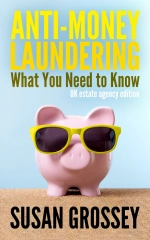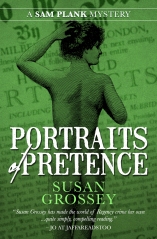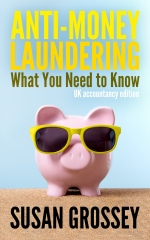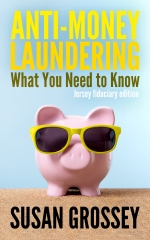Last week I was updating several clients on the progress of the Fourth Money Laundering Directive, highlighting for them the changes that I have noticed. Most proposed changes have received plenty of attention – PEP definition, register of beneficial ownership, etc. – but one quite significant change seems to have been missed by the press. It is amendment 50,which adjusts (wait for it) Article 2(1)(3)(e) – which lists who should be covered by the AML regime and so required to put in place AML policies and procedures – so that it now says this: “Other natural or legal persons trading in goods or services, only to the extent that payments are made or received in cash in an amount of €7,500 or more, whether the transaction is executed in a single operation or in several operations which appear to be linked.”
Did you notice that little word “services” sneaking in there? For some years now our AML regimes have included high value dealers – those who trade in goods for large amounts of cash. But those who trade in services for cash? Not so much. So who might this haul into the AML regime? Well, €7,500 is not a great amount, so it could well include any educational establishments – schools, colleges, universities – that accept tuition and/or accommodation fees in cash. Ditto hospitals, clinics (I am told that many people prefer to pay for cosmetic surgery by cash so that there is no documentary record of their procedure that could come out in court), therapists, etc. Expensive brothels and purveyors of other specialist personal services…
Of course, like their goods-selling brethren, I assume that the high value dealers in services will be able to exclude themselves from the AML regime by vowing never to accept cash payments of €7,500 or more. But it has all been suggested so quietly that I wonder how many of those who might be affected know what could well be heading their way? And to this I add my usual question: who will be the supervisory body for educational establishments, medical facilities and brothels, visiting them regularly to make sure that procedures are in place and all staff are aware of the obligations? Just asking…





















“Other natural or legal persons trading in goods or services, only to the extent that payments are made or received in cash in an amount of €7,500 or more, whether the transaction is executed in a single operation or in several operations which appear to be linked.”
=> should be covered by the AML regime and so required to put in place AML policies and procedures.
An interesting question which answer could have revealed a wide range of new opportunities for AML professionals. However, in Spain, the limit for cash payments is much lower tan €7,500. That should reduce the impact of the considered amendment.
Reblogged this on – PBCFT – and commented:
“Other natural or legal persons trading in goods or services, only to the extent that payments are made or received in cash in an amount of €7,500 or more, whether the transaction is executed in a single operation or in several operations which appear to be linked.”
=> should be covered by the AML regime and so required to put in place AML policies and procedures.
An interesting question which answer could have revealed a wide range of new opportunities for AML professionals. However, in Spain, the limit for cash payments is much lower tan €7,500. That should reduce the impact of the considered amendment.
Dear Eva
It is very early in the morning here as I write this, so I may be confused, but wouldn’t having a lower cash limit increase – rather than reduce – the impact of the amendment? If people who accept smaller amounts of cash (for goods or services) are included, that increases the number of businesses/professionals “caught” by the AML regime, doesn’t it?
But your comment is interesting, as it demonstrates that the FATF/MLD4 standards are a minimum, and often expressed quite loosely. It is then for each jurisdiction to adopt and adapt them to local taste and tolerance.
Best wishes from Susan
Pingback: A death-knell for HVDs | I hate money laundering
Pingback: Wham, bam, no AML, ma’am | I hate money laundering